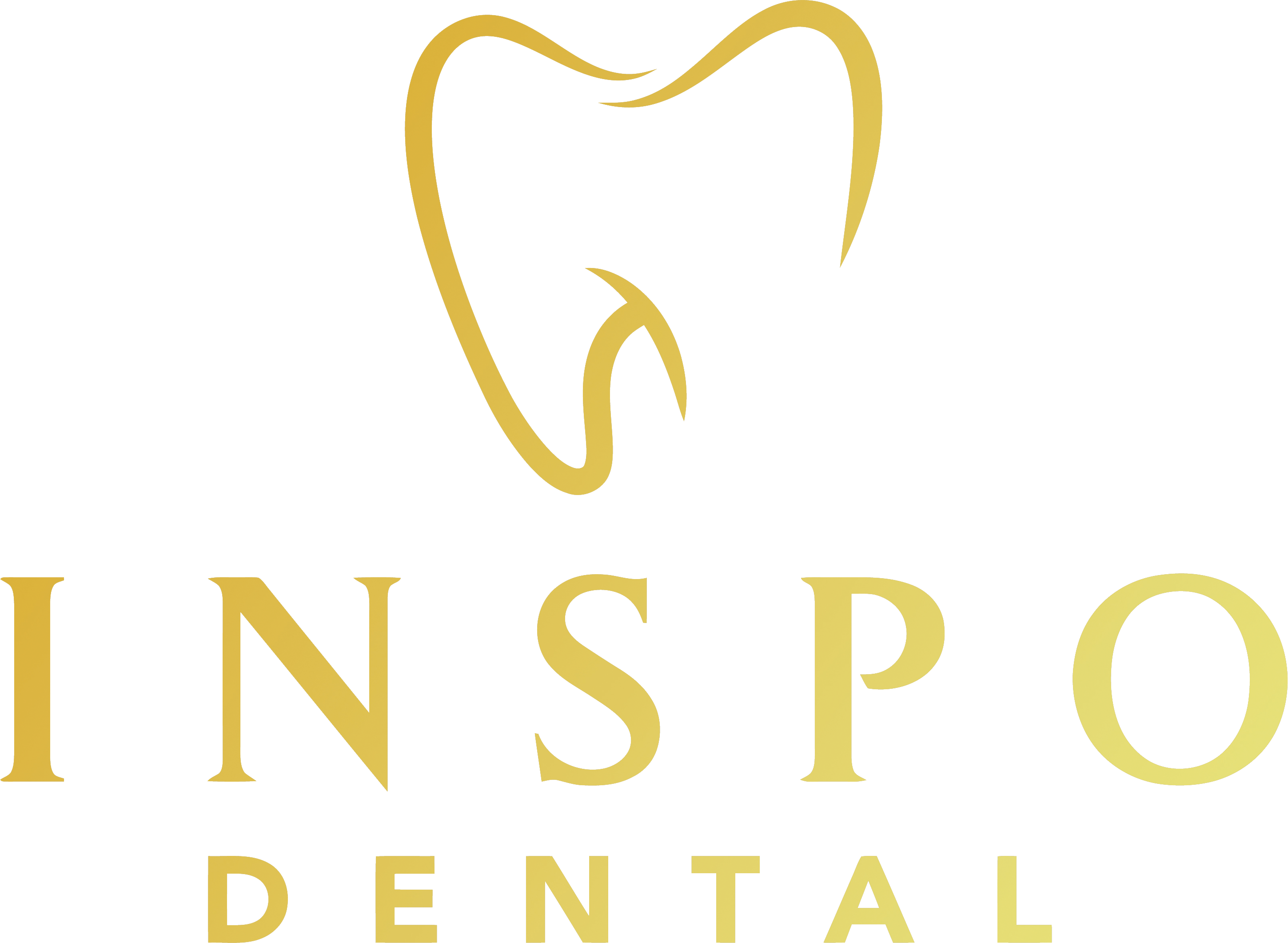Bridges
READY TO GET STARTED?
WHAT ARE DENTAL BRIDGES?
Beyond mere appearance, missing teeth can cause significant issues such as teeth shifting and discomfort when biting or speaking. A dental bridge effectively addresses these concerns by filling in gaps with a false tooth, supported by either dental implants, natural teeth, or a combination of both. At Inspo Dental in Red Bank, NJ, our skilled dentists specialize in crafting custom-made bridges using high-quality materials to restore both the aesthetics and functionality of your smile. If you’re missing one or more teeth, schedule a consultation to explore your restoration options with a custom bridge at Inspo Dental. Let us help you regain confidence in your smile and oral health.
ABOUT DENTAL BRIDGES
A dental bridge is a restorative dental solution designed to replace one or more missing teeth by “bridging” the gap with natural-looking prosthetic teeth. Dental bridges are anchored to the neighboring healthy teeth, called abutment teeth, or to dental implants, which provide a stable foundation. This approach not only restores the function and aesthetics of your smile but also helps maintain the alignment of your remaining teeth, preventing shifting or misalignment over time.
The process of getting a dental bridge begins with an assessment to determine the most suitable type of bridge for your needs, such as traditional, cantilever, Maryland, or implant-supported bridges. The abutment teeth are then prepared, and impressions are taken to create a custom bridge that matches your natural tooth color and shape. Once the bridge is ready, it is fitted and adjusted to ensure comfort, functionality, and a natural appearance.
Dental bridges offer a range of benefits, including improved chewing and speaking ability, restored smile aesthetics, and support for maintaining proper bite alignment. Ideal for those with missing teeth due to decay, injury, or gum disease, dental bridges provide a durable, effective solution for regaining both confidence and oral health. With proper care, a dental bridge can last many years, supporting a healthy, balanced smil
WHAT TO EXPECT WITH DENTAL BRIDGES
At Inspo Dental, we ensure your surrounding teeth are strong enough to support a dental bridge. During your initial visit, we conduct a thorough examination and take 3D oral impressions to create your custom bridge. If needed, a temporary bridge is provided until your permanent one is ready. Once your bridge is prepared, it’s securely placed or connected to dental implants. Expect improved function and aesthetics post-procedure. Schedule your consultation at our Red Bank, NJ office to learn more about restoring your smile with a custom bridge.

WHAT ARE THE BENEFITS OF DENTAL BRIDGES?
Certainly! Here’s the revised text for your website:
At Inspo Dental, dental bridges serve as a comprehensive solution for restoring a complete smile, offering a multitude of benefits, such as:
- Improved speech clarity and pronunciation
- Enhanced chewing and biting functionality
- Prevention of teeth shifting or misalignment
- Crafted from durable, long-lasting materials
- Confidence-boosting aesthetics
- Mitigation of potential speech impediments associated with missing teeth
- Enhancement of overall oral health by filling in gaps
- Comfortable and natural-looking replacement for missing teeth
Experience the transformative benefits of dental bridges at Inspo Dental. Schedule your consultation at our Red Bank, NJ office to discover how dental bridges can restore your smile and improve your oral health.
WHAT TO EXPECT WHEN GETTING A DENTAL BRIDGE?
01
Initial Consultation and Assessment
- Dental Exam: During the initial consultation, your dentist will examine your teeth, gums, and overall oral health to determine if a dental bridge is the best solution for you. X-rays or digital imaging may be used to assess the supporting teeth (abutment teeth) and the area of the missing tooth.
- Discussion of Options: The dentist will discuss the different types of bridges available, such as traditional, cantilever, Maryland, or implant-supported bridges, and recommend the option that best suits your needs.
02
Preparation of Abutment Teeth
- Tooth Preparation: In most cases, the neighboring teeth on either side of the gap (abutment teeth) will need to be prepared by removing a small amount of enamel to create space for the bridge’s crowns. This step is essential for the bridge to fit securely and comfortably.
- Impressions or Scans: Once the abutment teeth are prepared, your dentist will take impressions or digital scans of the area. These impressions are used to create a custom-fit bridge that matches the shape, color, and alignment of your natural teeth.
03
Placement of a Temporary Bridge (If Needed)
- Temporary Bridge: While your custom bridge is being fabricated, a temporary bridge may be placed over the prepared area to protect the abutment teeth and exposed gum tissue. This temporary bridge also helps you get accustomed to the feel and function of a bridge.
04
Fitting and Adjusting the Permanent Bridge
- Bridge Placement: At your next appointment, the dentist will remove the temporary bridge and fit your custom bridge. The dentist will ensure the bridge aligns well with your bite and make any necessary adjustments for comfort and stability.
- Cementing the Bridge: Once the fit is perfect, the dentist will cement the bridge in place with a strong dental adhesive, securing it to the abutment teeth. In the case of implant-supported bridges, the prosthetic teeth are attached to dental implants rather than natural teeth.
05
Bite Check and Final Adjustments
- Ensuring Comfort: The dentist will ask you to bite down and make small adjustments to ensure the bridge feels comfortable and functions well. A properly fitted bridge should feel natural and not interfere with your bite.
- Polishing and Final Touches: The bridge is polished and checked for a smooth finish, ensuring it blends seamlessly with your other teeth.
06
Aftercare Instructions and Follow-Up
- Oral Care Guidance: Your dentist will provide instructions on how to care for your new bridge, including proper brushing, flossing, and any special care techniques to ensure it remains clean and free of plaque. You may need to use a floss threader or special brushes to clean around and underneath the bridge.
- Regular Check-Ups: Regular dental check-ups are essential to monitor the bridge and ensure the health of the abutment teeth and surrounding gums. With good oral hygiene and consistent care, a dental bridge can last for many years.
WHAT ARE THE BENEFITS OF DENTAL BRIDGES?
Restores Smile Aesthetics
Improves Chewing and Speaking Ability
Prevents Teeth from Shifting
Supports Facial Structure and Prevents Bone Loss
Provides a Long-Lasting Solution
Non-Invasive Option Compared to Implants
Improves Bite Balance and Distribution
Customizable Options for Different Needs:
Boosts Self-Confidence and Quality of Life
Supports Adjacent Teeth and Prevents Wear
Easy to Maintain with Proper Care
Cost-Effective Option for Tooth Replacement
Immediate Restoration of Function and Appearance
Helps Maintain Proper Digestion and Nutrition
Reduces the Risk of Gum Disease
Minimally Invasive and Quick Procedure
Prevents Overeruption of Opposing Teeth
Custom-Fit for Natural Look and Comfort
Suitable for Multiple Missing Teeth
Stabilizes Dentures and Other Restorations
Enhances Overall Oral Health and Longevity
Encourages a Positive Approach to Dental Care
Improves Facial Symmetry and Appearance
Highly Reliable and Proven Solution
Prevents Overcrowding or Shifting of Teeth
Compatible with Future Dental Work
Supports a Balanced, Functional Bite
Encourages Positive Mental Health and Self-Esteem
HOW TO KNOW YOU NEED A DENTAL BRIDGE?
01
Missing One or More Teeth
02
Difficulty Chewing or Speaking
03
Shifting or Misaligned Teeth
04
Visible Gaps in Your Smile
05
Jaw Pain or Bite Issues
06
Premature Aging or Facial Sagging
07
Healthy Adjacent Teeth for Support
08
Not a Candidate for Dental Implants
09
Increased Risk of Gum Disease or Tooth Decay
10
Desire for a Long-Lasting, Non-Removable Solution
11
Previous Restorations on Adjacent Teeth
12
Jaw Alignment Concerns
Consulting with Your Dentist
Featured
REVIEWS
Inspo Dental exceeded my expectations! The team's professionalism and attention to detail made my teeth-whitening experience truly exceptional. I now smile with newfound confidence. Thank you, Inspo Dental!
As a healthcare professional, I value expertise and personalized care. Inspo Dental provided both seamlessly. From my comprehensive check-up to restorative work, their commitment to excellence is unmatched.
Inspo Dental is my go-to for family dental care. The team's friendly approach and commitment to creating a positive environment make dental visits stress-free. My kids actually look forward to their check-ups!
The precision in orthodontic care at Inspo Dental is remarkable. I opted for clear aligners, and the results speak for themselves. The team's expertise and dedication to my smile transformation were truly inspiring.
Contact
Inspo Dental
146 Maple Avenue
Red
Bank, NJ 07701
Hours Of Operation:
Monday 9:00am – 7:00pm
Tuesday 9:00am – 6:00pm
Wednesday Closed
Thursday 9:00am – 6:00pm
Friday 9:00am – 5:00pm
Saturday Closed
Sunday Closed


